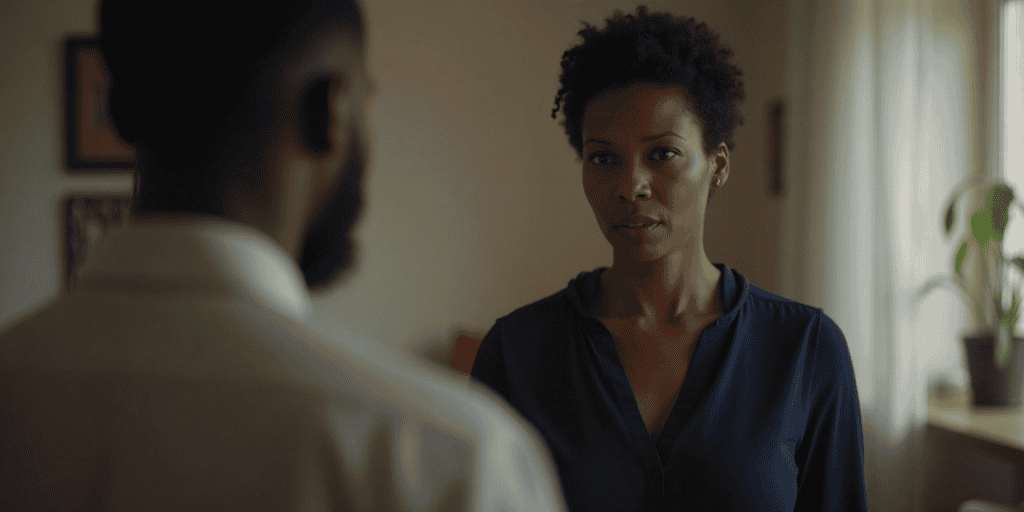Let me tell you the part that messed with my head the most:
Calling out my toxic family didn’t lead to growth, resolution, or even an honest conversation.
Nope.
It led to them crying, them telling everyone how hurt they were, and somehow, me being painted as the villain for finally speaking up.
For years, I stayed quiet because, as my grandmother told me, “you need to keep the peace.” But the truth? The drama was already there. I was just done pretending it didn’t exist.
This post is about how I deal with the guilt-tripping, the victim-playing, and the twisted gaslighting that comes after finally standing up for yourself.
And how do I protect my peace anyway during my 20 years with these selfish and self-centered people?
Table of Contents
The Moment I Realized I Wasn’t the Villain

I remember the moment it hit me.
It was during a family gathering. I had mustered the courage to address a recurring issue: How certain comments made by my aunt (my narcissistic mother‘s younger sister) were hurtful and inappropriate.
I spoke calmly, choosing my words carefully to avoid escalation. Her response? A dramatic gasp, followed by tears and a declaration:
“I can’t believe you think I’m a bad person.”
Suddenly, the room’s attention shifted. I was no longer the one expressing hurt. I was the aggressor, the one causing pain.
At first, I spiraled. How did I go from speaking my truth to being the one everyone was mad at? I started questioning myself. Am I the problem? Am I overreacting?
But then it clicked: being blamed for someone else’s behavior is classic emotional manipulation.
If you’ve been there, you know the pain of being punished for just trying to protect your peace.
Why Toxic Family Members Love Playing the Victim?

It took me a long time to realize that my family wasn’t misunderstanding me; they were choosing not to.
Because the second I stopped being the quiet, compliant version of myself, they didn’t see someone healing. They saw someone threatening the story they’d built around themselves.
They didn’t want the truth. They wanted control. And victimhood gave them exactly that.
It Shifts the Spotlight Away from Their Behavior
I remember the day I told my mother that I didn’t feel emotionally safe around her.
I said it calmly, during a phone call, after yet another interaction where she minimized how I felt and made a passive-aggressive comment about me being “so sensitive lately.”
I said,
“Mom, I feel like when I open up to you, I end up regretting it. I don’t think you actually hear me.”
Her response? She hung up.
Not even ten minutes later, my cousin texted me saying,
“Hey… your mom just called crying. She said you yelled at her and accused her of being a bad mother.”
I sat there staring at my phone, shocked. I hadn’t yelled. I hadn’t even raised my voice. But suddenly, I was the one who made her cry.
And now I wasn’t just dealing with my own pain. I was also being asked to comfort her through hers. Through something she had completely twisted.
That’s the trick. When toxic people play the victim, your story vanishes. The truth becomes irrelevant. The entire focus shifts to their performance of pain, not the actual source of harm.
And if you’ve been conditioned to keep the peace? You’ll fall right back into line. Apologizing, soothing, trying to make it right.
Even though it was never your mess to clean up in the first place.
It Triggers Your Guilt (and Keeps You in Line)
I used to tell myself I wasn’t going to say anything anymore. It wasn’t worth the drama. That I’d just “pick my battles.”
But the truth is, I stopped speaking up because I couldn’t handle how bad I felt after I did.
After I told my older sister she was crossing boundaries with how she talked about my partner, constantly criticizing him, and making side comments about our relationship, she cried. Not to me, though.
She went straight to our aunt and said I had “turned on her” and was “acting brand new ever since I got into a serious relationship.”
It worked. My aunt called me and said,
“You should apologize. She’s really hurt. You two used to be so close.”
And just like that, the narrative wasn’t “She disrespected your partner.” It was “You’re ruining the sisterhood.”
No one asked what she said. No one asked why I finally said something. They just heard tears and assigned me the role of villain.
So yes, I started doubting myself. I’d lay awake going over the conversation again and again. Should I have used different words? Was it the tone? Maybe I came off too strong?
But here’s what I finally learned: They weren’t reacting to my tone. They were reacting to losing the upper hand.
If someone only feels pain when you say, “Stop hurting me,” it’s not about pain. It’s about power.
It Protects Their Image Around Others
This is the most isolating part.
Because the moment you start speaking your truth, they start spinning their version of it, and they do it fast.
When I told my cousin I wasn’t going to come to my mother’s birthday dinner, after months of being ignored in group texts, after years of her making passive jabs about my career and life choices, I said it simply:
“I love you, but I’m not willing to pretend we’re close when we haven’t spoken in months.”
That’s it. By the time that message made its way through the family grapevine, I had apparently said,
“I hate this family and I’m better than everyone.”
Even people who knew me well were like, “What’s going on with you?” And I realized something chilling: they weren’t asking because they cared. They were asking because they already believed the version they’d been told.
That’s the thing about toxic families. The one who calls out dysfunction is always cast as the unstable one.
Because as long as they’re the victim, they get to stay “good.” You get to be the problem child, the ungrateful one, the distant one.
And it works… until you finally stop playing the part.
The Old Ways I Responded (That Didn’t Work)

I tried being nicer. More understanding. More patient. I thought if I could just explain better, be softer, they’d finally get it.
But here’s what I’ve learned: you can’t reason someone out of a mindset they’re using to protect their ego.
Over-explaining Myself
I’d write long texts. I’d give examples. I’d anticipate their objections and counter them before they even said them.
But none of it mattered, because they weren’t actually listening. They were just waiting for their turn to play the victim again.
Apologizing Just to End the Drama
There were so many times I said “I’m sorry” when I wasn’t. I wasn’t sorry for what I said. I was sorry for the emotional storm that followed.
But that kind of apology only teaches toxic people that their tactics work.
Getting Angry and Then Feeling Guilty
Sometimes I snapped. I got tired of being the “calm one” and let the frustration spill out.
But then they’d really lean into the victim role. And suddenly I was apologizing not just for setting a boundary, but for how I did it.
It became a trap. One I didn’t see clearly until I stopped trying to win and started trying to heal.
Later, I came across a study that explained how suppressed anger in close relationships often leads to guilt and self-blame when it finally surfaces.
That hit home. I wasn’t just reacting out of nowhere, I was carrying emotional weight that had nowhere else to go.
The New Boundaries I Use That Actually Work

For years, I thought setting boundaries meant confrontation. That it had to be loud, dramatic, final.
It doesn’t.
Real boundaries don’t always look like walls. Sometimes they look like clarity. Like silence. Like walking away before you get dragged back into old roles you’ve outgrown.
These are the boundaries I’ve learned to use. Not perfectly, but consistently. And they’ve changed everything.
I Call Out the Behavior, Not Their Character
During a group call, my sister made a backhanded comment:
“Oh, you’re suddenly so wise now that you’ve read a few self-help books?”
In the past, I would’ve snapped. Instead, I calmly said,
“That’s not what I said, and you know it.”
No attacks. Just clarity.
She had nowhere to go with it. And for once, I didn’t feel guilty afterward.
I Let Them Be Uncomfortable With the Truth
I told my mom I needed space after years of guilt-tripping and emotional dumping. Her response?
“I guess I’m just a terrible mother then.”
But I didn’t take the bait. I said,
“This isn’t about labels. It’s about how I feel when I’m around you.”
Then I let the silence sit.
She was uncomfortable. But for once, I wasn’t the one rushing to fix it.
I Use the ‘Broken Record’ Method
My brother kept pushing me to come to a family gathering I had already declined, three times.
Every time, I said the same thing:
“I’ve made my decision. I’m not discussing this again.”
No arguments. No explanations. Just calm, consistent boundaries.
Eventually, he stopped asking.
I Leave the Conversation If It Turns Into a Pity Show
After I told my sister I didn’t appreciate her gossiping about me to our cousin, she teared up and said,
“I guess I’m just the worst sister in the world.”
I used to console her when she did that.
This time, I said,
“I’m not available for this. Let’s talk later.”
And I ended the call. Without guilt, without needing her to understand.
What I’ve Learned That Took Me Way Too Long?

At first, setting boundaries felt wrong. Like I was being harsh, selfish, or even cruel. But the truth is, it just felt unfamiliar… because I’d spent so long putting other people’s comfort ahead of my own.
What I know now:
- You can’t control how they feel about your truth. I tried softening my words, being gentle, making it easier for them to hear. But no matter how I said it, they heard what they wanted. Their reaction doesn’t mean I was wrong; it just means I stopped playing along.
- You’re not meant for saying what’s real. My honesty used to be met with silence, tears, or guilt trips. I thought I was being too harsh. Now I know that truth isn’t cruelty. It’s clarity.
- Their guilt-tripping is proof that the boundary worked. The pushback I got, the drama, the pity, the stories told behind my back, that was never a failure. That was the sign that the boundary hit where it needed to.
The guilt fades. The peace doesn’t.
Quick Recap & Key Takeaway
- Call out the behavior, not the person.
- Let them sit with the truth.
- Repeat your boundary calmly.
- Walk away when they flip the script.
None of this came easily. I felt guilty, questioned myself, and almost backed down more times than I can count. But every time I chose myself, I got a little freer.
You’re not wrong for setting boundaries. You’re just done being the one who always bends.
Let them play the victim.
You don’t have to play the rescuer anymore.
Bottom Line: You’re Not the Villain For Telling the Truth
Toxic families will spin your boundaries into betrayal and your truth into an attack.
But that guilt you’re feeling? It’s not proof you’re wrong. It’s proof that you finally broke the cycle.
They play the victim to stay in control—but you’re done playing along.
And if you’re ready to stop questioning yourself every time they cry, twist your words, or turn the whole family against you, that’s exactly what The Next Chapter is here for.
It’s your step-by-step guide to reclaiming your peace, your voice, and the self-trust they tried to take from you.
You don’t owe them your silence. You owe you freedom.
Related Posts:
- 13 Savage Replies I Used on Narcissists’ Insults: 100% Satisfaction Guaranteed
- 10 Powerful Phrases to Use When Narcissists Belittle You (That Actually Work)
- The Conversation Technique I Use That Narcissists Can’t Handle (And Why It Works So Well)
- 9 Signs You’re Finally Dangerous To A Narcissist: It’s Not What You Think
- 13 Dark Signs You’re More In Control With The Narcissists Than You Realize


